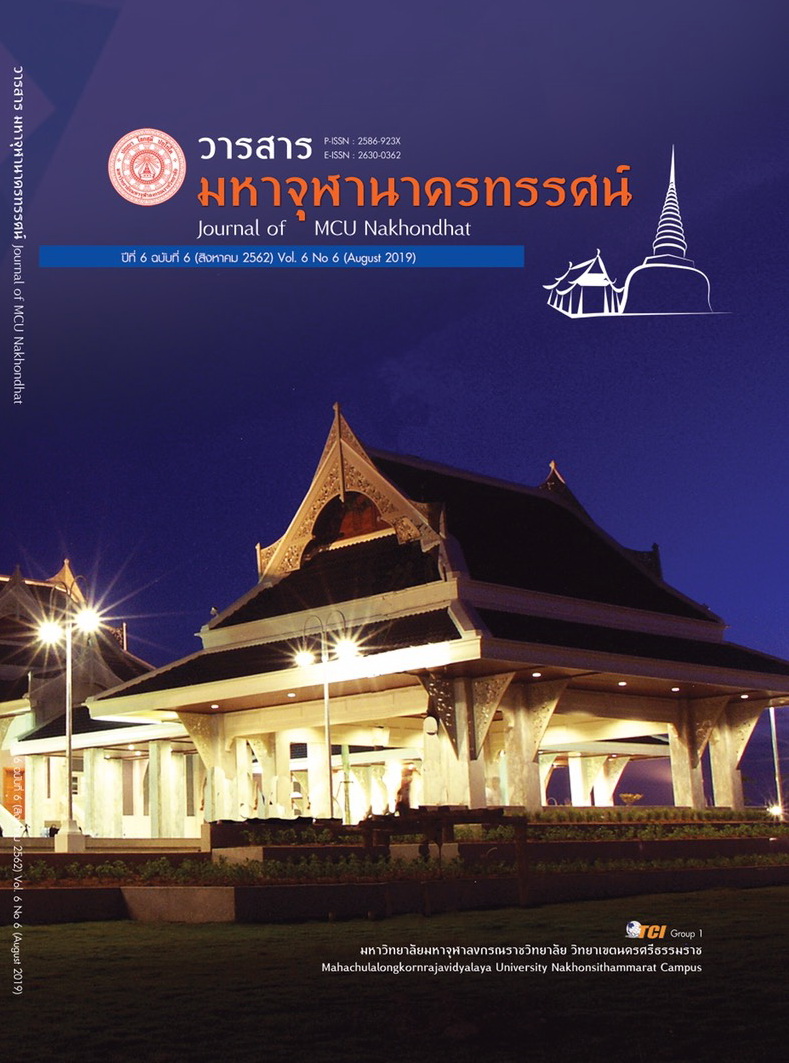BUDDHIST PSYCHOLOGICAL PARADIGM IN THAI COUNTRY SONGS
Main Article Content
Abstract
The thesis entitled ‘Buddhist Psychology for Development of Virtues and Happiness in Thai Country Songs’ is of 3 objectives: 1) to analyze the structure, content, elements and process of country songs based on Buddhist Psychology in terms of principles, methods and goals of Thai country songs; 2) to integrally synthesize the Buddhadhamma and Psychological principles for the development of virtues and happiness in Thai country songs; and 3) to propose the development model of virtues and happiness based on Buddhist Psychology in Thai country songs. This study is a Mixed methods research between a qualitative research and quantitative one, using an In-depth interview to collect qualitative data from 17 key informants and questionnaire to collect quantitative data from 440 samples who are students of King Mongkul Institute of Technology Ladgrabang. A content analysis is used to analyze qualitative data and statistics including Frequency, Percentage, Mean and Inferential analysis statistics comprising t-test, F-test and One-way ANOVA are used to analyze quantitative data.
Results are as follows.
- From the analyzing of the structure, content, elements and process of country songs based on Buddhist Psychology in terms of principles, methods and goals of Thai country songs it found that Thai country songs structure consisted of dramatic works, acting and literature for transmitting the story in walks of villagers’ life regardless of love, family, culture, tradition, religion, politics and administration partially mixed with visual arts to transmit melody, rhythm and content of the country songs even if It basically emphasized the entertainment but the classical country songs were of profound contents related to the understanding of life for the development of virtues and happiness, so besides the entertainment good listeners had got a wisdom from the content of country songs as well.
- Regarding the integrally synthesizing of the Buddhadhamma and Psychological principles for the development of virtues and happiness in Thai country songs it revealed that the integration of Buddhist Psychology found in Thai country songs included the Four Noble Truths that was basically the problems solving process, the principle of Threefold Training which was the development process of virtues and happiness called the systems of precept, concentration and wisdom the three of which were related to each other in the development process of people’s virtues and happiness and the development of power or competency of people as Five Powers including faith, effort, mindfulness, concentration and wisdom, besides, the happiness was also developed as 5 elements of concentration comprising satisfaction, coolness, cheery, happiness and calmness.
- With regard to the proposal of the development model of virtues and happiness based on Buddhist Psychology in Thai country songs it found as follows: 1) The measurement of virtues and happiness based on Buddhist Psychology in Thai country songs it revealed that the most respondents were female, fresh, belonging to Faculty of Science, their family’s occupations as public servants/state enterprise and hires, being interested in elements of music, self-determination of songs, being interested in melody, rhythm and content of the country songs the mean of which was high at 3.98, they were highly happy at the mean of 3.61, besides it showed their sex effected on the difference of their satisfaction with the language in the song and it also showed that their class of study, faculty, family’s occupation, points of music interests and determination/non-determination of songs were different in the level of satisfaction with singers, music, content, language, virtues and happiness in terms of satisfaction, coolness, cheery, happiness and calmness. 2) The development model of virtues and happiness based on Buddhist Psychology in Thai country songs it revealed that the development model was related to the development principle in the process of the Four Noble Truths in terms of the content of songs. The authors explained the condition of problems or social problems, its causes, cessation of problems and ways out of problems. Composing a song as the process of the Four Noble Truths was the determination of problems covered the realization of reasons of points, ways out and solutions and because Thai country songs were various and flexible in the aspects of content, goal and methods they could have integrally synthesized contents and positive reality in multi-dimension in association with circumstances based on Buddhist Psychology with the end.
Article Details
References
พระพรหมคุณาภรณ์ (ป.อ. ปยุตฺโต). (2542). การศึกษาเพื่อสร้างบัณฑิตหรือการศึกษาเพื่อเพิ่มผลผลิต. (พิมพ์ครั้งที่ 2), กรุงเทพมหานคร: มูลนิธิพุทธธรรม.
พระมหาสมชัย สิริวฑฺฒโน (ศรีนอก). (2537). หลักธรรมทางพระพุทธศาสนาที่ปรากฏอยู่ในบทเพลงลูกทุ่งไทย. ใน วิทยานิพนธ์มหาบัณฑิต สาขาวิชาพระพุทธศาสนา. มหาวิทยาลัยมหาจุฬาลงกรณราชวิทยาลัย.
ภัทยา ภักดีบุรี. (2535). การศึกษาวรรณกรรมเพลงของ ไพบูลย บุตรขัน. ใน วิทยานิพนธ์การศึกษามหาบัณฑิต สาขาวิชาภาษาไทย . มหาวิทยาลัยศรีนครินทรวิโรฒ สงขลา.
มาลินี ไชยชำนาญ. (2535). การศึกษาวิเคราะห์วรรณกรรมเพลงลูกทุ่งของชลธี ธารทอง. ใน ปริญญานิพนธ์การศึกษามหาบัณฑิต สาขาวิชาภาษาไทย. มหาวิทยาลัยศรีนครินทรวิโรฒ สงขลา.


